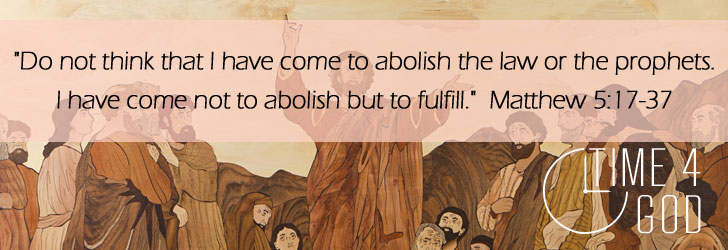The Fulfillment of the Law
The law. That word is difficult, and why shouldn’t it be. The fact is that we need the law. Because we are prone to making mistakes, large and small, and because the harm we do demands justice.

The law. That word is difficult, and why shouldn’t it be. The fact is that we need the law. Because we are prone to making mistakes, large and small, and because the harm we do demands justice. The law exists, therefore, to give us both guidance and recourse to justice. But let us look at the law through the prism of the scriptures to see how it reveals God’s wisdom to us.
The law Jesus is referring to here is, of course, the Ten Commandments. These were the commandments that God gave directly to Moses on Mount Sinai to give to the people in turn, so that they would have the guidance they needed to be worthy of inheriting the Promised Land. They were ten. When we look at them closely, we see that the first three have to do with our relationship with God, and the last seven have to do with our relationships with each other. They are expressed, of course, in the negative form and, as we know only too well, we are prone, in our fallen nature, to rebel against such commands. It takes a certain maturity to be able to see those commands, not as limitations, but as clear guides to true freedom and happiness.
[content-ad]
Jesus recognizes in this passage that the law is not just good, but eternal. He has not come to change the law but to fulfill it in our sight. He is the fulfillment of the law. If we keep our eyes on Jesus we will see what living in accord with the law looks like. We can see its positive, life-giving, and redeeming effects on the world. He is telling the people before him (and us) to look at the scribes and the Pharisees, who by Jesus’ time had created over 600 laws for the people to observe. They also presided over the application of punishments for the breaking of these laws, though as Jesus proves so many times, they do not keep them ʺperfectlyʺ themselves. Jesus says to the people, ʺI tell you, unless your righteousness surpasses that of the scribes and Pharisees, you will not enter the kingdom of heaven.ʺ (Mt. 5:20) When Jesus is asked later in Matthew’s Gospel, ʺTeacher, which is the greatest of the commandments?ʺ He replies, ʺLove the Lord your God with all your heart and with all your soul and with all your mind. This is the first and greatest commandment. And the second is like it: ‘Love your neighbor as yourself. All the law and the Prophets hang on these two commandments.ʺ (Mt. 22:36-40) Jesus has not ʺchanged the smallest letter or the smallest part of a letterʺ of the law here, he has simply given us a new way of looking at it. He has taken the Ten Commandments in their negative formulation and turned them into these two affirmative, positive commands. We are to no longer obey out of fear, but to live out of love. He switches the perspective from ʺnot doing sinʺ to ʺdoingʺ love in the world with our lives.
Jesus has shown us what the fulfillment of the law will look like. If we truly love God, we could never imagine putting lesser things, idols of all kinds, before him. If we truly love God, we could never utter his name in any other way but adoration. If we truly love God, then our observance of the Sabbath is not a mere matter of prescribed law, but a matter of purest joy. If we truly loved others as we ought to love ourselves and treated them the way we wish to be treated, we could never disrespect our parents, or each other in any way. We would not do anyone harm in any manner, rather, we would honor them with the infinite respect and dignity that is due them as children of the same God and Father. Paul, in his letter to the Romans, puts it this way: ʺOwe nothing to anyone, except to love one another; for the one who loves another has fulfilled the law…Love does no evil to the neighbor; hence, love is the fulfillment the law.ʺ (Romans 13:8-10)
Paul is remembering here Jesus’ final commandment to him and the other apostles, ʺMy command is this: Love each other as I have loved you.ʺ (Jn. 15:12) In these words Jesus has expressed the fulfillment of the law. Jesus did not just command us to love one another, he did it with his very life, dying on the cross, bearing all of our sins, in order to show us how much he loves us. This is the kind of love that he is commanding of us. A love that sacrifices for the good of others selflessly, that forgives, that liberates, and that empowers others to live to their lives to the fullest in this world. This commandment contains of the Ten Commandments. It contains and fulfills the Two Great Commandments. This is the fulfillment of the law then, now and forever. This is the law of Heaven, the eternal law of love. Thanks be to God who is love in all of its fullness.
SKM: below-content placeholderWhizzco for FHB

